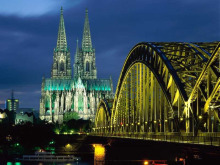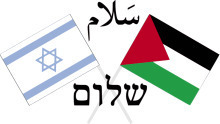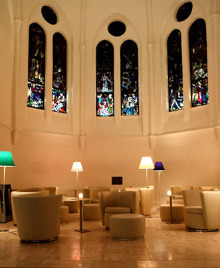Matt Rees's Blog - Posts Tagged "cologne"
Book Tours Not Just Ego Tripping
 Not long ago a friend of mine commented that my travels to promote my books must be a great pleasure to me. “You just have to talk about yourself,” he sneered. “You must like that.”
Not long ago a friend of mine commented that my travels to promote my books must be a great pleasure to me. “You just have to talk about yourself,” he sneered. “You must like that.”I ignored the implied insult (until now). But it struck me that people might think book tours are literally ego-trips. Wrong on two counts.
First, it’s only on book tour that people will frequently come up to you and say that you look better in your jacket photo. In Aachen last year, a bookseller pointed at my photo and said, “This handsome man is not you.” In Hamburg, a woman said: “The photo was taken many years ago, no?” How good is that for your ego?
Second, the experience of a new place in the company of people whose concern at that moment is with the world of literature – not politics, finance, or mothers-in-law -- is one of the greatest pleasures imaginable.
Last week I was in the Rhineland city of Cologne at the invitation of the Cologne-Bethlehem Twin Cities Association. Each year on Epiphany (which celebrates the arrival of the Three Kings in Bethlehem, following the star to Jesus’s manger) they arrange a reading related to Bethlehem. That’s because the bones of the Three Kings are kept in Cologne’s astonishing Gothic cathedral. This year they picked “Der Verraeter von Bethlehem,” which you may know as my first Palestinian crime novel “The Collaborator of Bethlehem” (UK title: “The Bethlehem Murders”).
I arrived late at night and did a few interviews in the morning with local press. Then I strolled (if you can really stroll in minus-5 degrees whipping of the river) to the cathedral with Saskia Heinemann, a Cologne-native who works for my Munich publisher Beck Verlag.
Inside, the high vaults of the ceiling were loaded with incense. Three youngsters dressed as the Three Kings were singing “Gloria in Excelsis Deo” to a surprisingly packed congregation. After the priest’s blessing everyone filed behind the altar to the golden shrine where the bones of the Three Wise Men are kept. It glimmered behind a trio of candles marked with the initials of Caspar, Balthasar and Melchior. The cathedral organ played joyously and the bells joined in.
I never take part in any kind of ritual (except for the way I make espresso every morning). As a journalist I watch rituals. As a writer I’m always somehow outside, too, making notes for a way to use such a scene in a future book. This time I found myself moved to be shuffling among the crowd, looking up at the massive columns and stained glass. Somehow I was watching and listening and smelling all the happy Christmases I haven’t had, the unhappy emptiness in which for many people the urge to be a writer is nurtured. But that’s a subject for another time….
Cologne was almost entirely destroyed in WWII. Miraculously the cathedral suffered little damage. The town’s collection of beautiful Romanesque churches (I particularly loved Gross St. Martin) were rebuilt from what remained. Out of reach of the bombs, beneath the town hall square, the oldest synagogue in Europe was recently discovered. I watched through the side of the marquee where the remains are being unearthed by a freezing group of archeologists.
In the traditional beerkeller Frueh, I warmed up with leberknoedel soup and Haemchen, which is essentially the upper back leg of a pig, boiled. I peeled away the layers of fat, white as an Englishman’s tummy, and a large burnt-umber glob which was apparently clotted blood. Then I put away a good few pounds of delicious, salty, soft ham.
Before my reading that night at the Ludwig bookshop in the main station, Miriam Froitzheim arrived from nearby Aachen with a consignment of Printen, the best cookies in Germany. They’re sweetened with honey, not sugar, and covered in a rich chocolate.
The reading was a welcome opportunity to discuss my first novel – which sometimes seems like ancient history to me, as I’ve written four more (one still in manuscript form) since then. Still it was only published in English in 2007 and, in Germany, two years ago.
I dined with some of the bookshop staff, and Udo Hombach, the retired music teacher who read a couple of chapters from my book in German for the audience. An aficionado of churches built by the last Kaiser (several in the Rhineland, and a couple of notable ones in Jerusalem, including the Ascension Church where I did a reading recently and admired the massive ceiling mosaic of Kaiser Wili himself) turned artist, Udo produced a handful of colorful mosaic tiles from his waistcoat pocket. His father had gathered them from the ruins of one of the Kaiser’s churches in Berlin after a bombing raid. Now Udo uses them to make mosaics for his gallery. (You can find it Am Roemerturm 15 in Cologne.)
The following day I nipped around the Museum Ludwig in central Cologne. It’s one of the greatest collections of Expressionist art. That was a change from the Renaissance art in which I’ve been immersed of late, and the building itself is light and spacious, a little like the cathedral next door. Even the luggage lockers were avant garde (the numbers were on the inside, so you kind of had to guess...).
Then I zipped off to the airport feeling very content. You see, at my reading, a woman pointed to the author photo on the jacket and said: “You look much better in real life.”
Writer is pro-Palestinian and pro-Israeli
 The best thing about moving from journalism to fiction writing is that people show you more respect.
The best thing about moving from journalism to fiction writing is that people show you more respect.As a journalist covering a troubling issue like the Israel-Palestinian conflict, I was often subject to rather nasty verbal attacks during public speaking engagements. For a partisan of either side, I seemed a fine target for their generalized contempt—they thought journalists were all against them and here was a live reporter on whom they could vent their spleen.
Thankfully that doesn’t happen now that I’m the author of a series of Palestinian crime novels. I wasn’t sure that it would be different, but it turns out that there’s a big change in the way people behave toward me.
Here are two examples from the last week alone.
In Cologne, Germany, last week, I talked in a bookstore at the invitation of the Cologne-Bethlehem Association. Much of the audience was made up of middle-aged and older Germans who visit Bethlehem frequently and have made strong ties with the people there.
One older gentleman suggested that, because my first novel THE COLLABORATOR OF BETHLEHEM shows the corruption and extortion carried out by the gunmen of the town during the intifada, my book “tended toward Israeli propaganda.”
But the old fellow was very respectful and as I answered him I could tell he was listening. (My response, of course, is along the lines of “No, actually the book doesn’t even address whether or not it’s right to shoot at Israelis; the book concerns itself with the negative effect those gunmen had WITHIN Palestinian society.”) Listening’s something that was often evidently not happening when, as a journalist, I would talk to audiences.
Then this week I went to the Israeli settlement of Efrat in the West Bank. I’ve visited many times before to write news reports about the confiscation of land or the endless pressure from Washington to stop building in the settlements. This time I was invited by the Gush Etzion Book Group, a few dozen women who live in the local settlements.
There had been quite some fiery debate within the group about whether to have me come and speak to them. Indeed, someone hinted that certain members of the group had stayed away.
Nonetheless, I was glad to be there. After all, much of THE COLLABORATOR OF BETHLEHEM takes place in the village of Artas and the Dehaisha Refugee Camp, which abut the northern reaches of Efrat. I want very much to talk about my books with people who have a stake in the Israeli-Palestinian struggle. Provided they’re willing to listen respectfully, to examine what I’m actually saying and not what they think I’m saying (or what they wish I’d say.)
The evening in Efrat went well and, in fact, much of what we talked about was how little I’m interested in politics—despite the apparently political subject-matter of my novels. What interests me is “the life that remains when politics is sluiced away like the filth a stray dog leaves in the street” (that’s a line from my sleuth Omar Yussef in THE FOURTH ASSASSIN, the next of my novels, which will be published Feb. 1).
Such respectful treatment is a big contrast to situations I encountered as a journalist. Then I would look out over audiences which seemed to be entirely red-faced and with arms crossed over every chest. The hostlie body language didn’t change, even though I was essentially saying the same things I’m saying now. Partisans hate journalists and, I believe, many of them used somehow to detest that I had found a kind of personal peace in covering the very conflict that stirs them up and stresses them so.
In Cologne and Efrat, people heard what I had to say and understood that I’m pro-Palestinian and pro-Israeli. I'd like all the people I know here to have a good life, not the violent situation they suffer. Politics makes people choose sides, and I want no part of that.
I also think choosing sides makes for rather bad novels. It’s in the shades of gray, where decisions are so difficult or even impossible to make, that a novel becomes truly compelling--think of Graham Greene’s best novels. Political journalism on the other hand is, to say the least, dreary. Think of the glib rubbish turned out by columnists who have to fill three op-ed spaces each week.
Who would you respect more—Graham Greene or G. Gordon Liddy? See what I mean?
So I’ll continue to talk about my books to anyone who’ll take the time to read them, because that in itself is a sign of respect and openness. Those, after all, are the qualities most needed by both sides of the Israeli-Palestinian conflict if they’re ever to find peace.
(I posted this first on a joint blog I write with some other international crime writers.)
Published on January 14, 2010 23:21
•
Tags:
bethlehem, book-groups, cologne, crime-fiction, efrat, fiction, g-gordon-liddy, graham-greene, gush-etzion, international-crime-authors-blog, israel, israelis, journalism, koeln, matt-beynon-rees, mystery-novels, omar-yussef, palestine, palestinians, politics, settlements, settlers, the-collaborator-of-bethlehem, the-fourth-assassin, west-bank
Bielefeld does exist!
 On my book tours I often venture to places few others visit. There are book festivals in tiny provincial towns. Readings at bookshops in small rural villages. This week I spoke in a German town that many Germans are convinced doesn’t even exist.
On my book tours I often venture to places few others visit. There are book festivals in tiny provincial towns. Readings at bookshops in small rural villages. This week I spoke in a German town that many Germans are convinced doesn’t even exist.Bielefeld (population 330,000) is a town in North Rhine-Westphalia. Or is it?
Since the 1990s, there has been a widespread internet campaign to convince Germans that this town doesn’t exist. It began as a light-hearted battle over computer codings between some fellows in Bielefeld and others elsewhere (who took a different view of the coding and decided to fight back.) Even though most of them know it exists (or do they?), Germans often respond to mention of Bielefeld with the words, “Bielefeld doesn’t exist."
This is because the town is rarely visited, doesn’t have a regional accent of its own, isn’t mentioned in the news very often, and had for a long time a railway station that looked boarded up. There are also few monuments or great buildings there, because…well, you can thank the USAAF and the RAF for that. (Bielefeld isn’t far from the Ruhr and was heavily bombed in World War II.)
The city council once released a statement titled “Bielefeld does exist,” but they released it on April Fools Day. So it looked as though the city council even was saying Bielefeld didn’t exist.
But I went there. And it does exist. In fact, it’s quite nice.
Read the rest of this post on my blog The Man of Twists and Turns.
Published on September 02, 2010 01:24
•
Tags:
andreas-schnadwinkel, bad-oeynhausen, bielefeld, book-tours, cologne, germany, hitler, internet, jews, judaism, leni-riefenstahl, rhineland, synagogue, thomas-wolff



